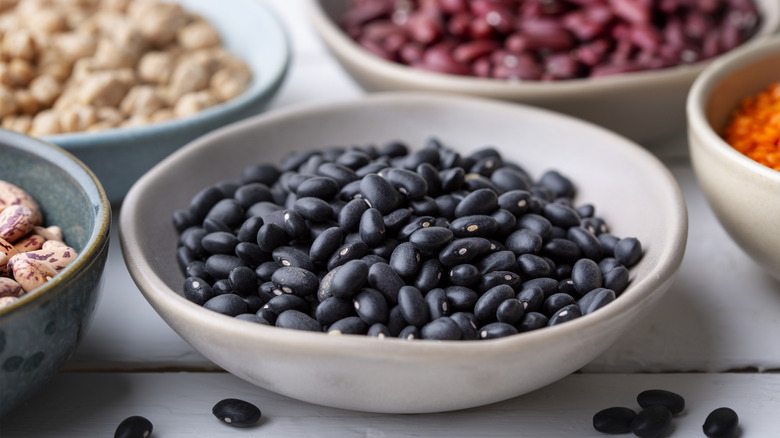
As a child, you likely couldn’t help but chuckle when beans were served at dinner. After all, who could resist the timeless rhyme, “Beans, beans, the magical fruit, the more you eat…” – you know the rest. Nevertheless, you filled your plate with those sweet, saucy pork and beans alongside a grilled hot dog because even though beans might create some noise later, they were worth it. As you grew older, you perhaps relied on that “magical fruit” to help cleanse your digestive system, keeping things moving and your gut content.
You can attribute this to the fiber in beans. A cup of black beans provides 15 grams of fiber, which is more than half of your daily fiber requirements. But the benefits of black beans extend beyond digestion. Recall another part of the rhyme, “Beans, beans, good for your heart.” The soluble fiber in black beans can aid in preventing heart disease by reducing your “bad” LDL cholesterol. Additionally, because fiber slows digestion, it helps to prevent blood sugar spikes after meals, lowering your risk of type 2 diabetes.
However, you’ll want to choose black beans for more than just their fiber content. According to a 2021 article in Nutrients, black beans are rich in anthocyanins, an antioxidant that gives them their dark color. Compared to lighter-colored beans, black beans contain more of these phytochemicals to help manage your blood sugar and support heart health.
How black beans fight heart disease

You may already understand how soluble fiber works to lower your cholesterol. Soluble fiber binds to the cholesterol in your intestine and helps remove it from your body. This results in less cholesterol circulating through your bloodstream. Black beans also combat heart disease in additional ways, as noted in a 2022 review in Plants. The phytochemicals in black beans prevent your blood’s platelets from clumping together, which can occasionally lead to blood clots. Anthocyanins assist in relaxing your blood vessels and enhancing circulation by boosting nitric oxide. Beans also help control inflammation in your body, which can often lead to heart disease.
Replacing your favorite rice with some black beans can work to improve your cardiovascular system in the short term. In a 2021 study in Nutrition, Metabolism and Cardiovascular Diseases, participants ate either beans or rice and then had their blood pressure, blood flow, and cholesterol checked a few hours later. Eating beans reduced blood pressure and artery stiffness compared to rice. Black beans had the strongest effect on cardiovascular health, improving blood flow and lowering cholesterol within six hours.
How black beans lower your diabetes risk

Increasing your bean consumption can lower your risk of type 2 diabetes. Although a 2018 study in Clinical Nutrition didn’t focus solely on black beans, it discovered that individuals who consumed the most beans had a 35% lower risk of developing type 2 diabetes. Much of the anti-diabetic power of black beans lies in their outer skin, according to a 2023 article in the Journal of Functional Foods. Researchers extracted the phytochemicals from the skin of black beans and administered the extract to diabetic rats. The extract lowered blood sugar, reduced inflammation and oxidative stress, and improved cholesterol and fat metabolism. The peel of the black bean also supported the gut microbiome, which plays a role in metabolic health.
If you really enjoy rice but want to avoid the blood sugar spike, try adding black beans. A 2012 study in the Nutrition Journal had people with type 2 diabetes eat either rice or rice mixed with three types of beans. Researchers monitored their blood sugar levels for three hours post-meal. Compared to rice alone, the beans-and-rice mix caused smaller increases in blood sugar. Among the beans, black beans and pinto beans were more effective at reducing blood sugar than red kidney beans.
While traditionally cooked black beans can help reduce your risk of type 2 diabetes, fermented black beans may offer even more benefits. A 2020 study in Legume Science found that fermenting black beans enhances their protein and phytochemical content. These nutrients can block enzymes that contribute to blood sugar spikes and fat accumulation.




